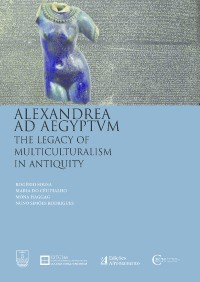Please use this identifier to cite or link to this item:
https://hdl.handle.net/10316.2/36157| DC Field | Value | Language |
|---|---|---|
| dc.contributor.author | Pimentel, Maria Cristina de Castro-Maia de Sousa | |
| dc.date.accessioned | 2015-03-27T09:24:51Z | |
| dc.date.accessioned | 2020-09-09T14:04:26Z | - |
| dc.date.available | 2015-03-27T09:24:51Z | |
| dc.date.available | 2020-09-09T14:04:26Z | - |
| dc.date.issued | 2013 | - |
| dc.identifier.isbn | 978-989-26-0966-9 (PDF) | |
| dc.identifier.uri | https://hdl.handle.net/10316.2/36157 | - |
| dc.description.abstract | Our paper intends to focus on Alexandria after the Roman annexation: what traces of its splendour and glory do we find in classical Latin literature? What repercussions of the changes suffered after 30 B.C. called the attention of these authors? What did the Romans think of the inhabitants of Alexandria, and what relationship did they have with the history of that part of the world? Greek literature is rich in information on Egypt and Alexandria, but from this image of a magnificent city that the Greeks have left us, what do the Latin authors echo? What is made of its population, Greeks, Egyptians, Syrians, Jews, people coming from all parts of the world? The portrait we can trace is, of course, imperfect. To get as close as possible to Roman Egypt, we would have to rely on the information provided by Greek Literature, by Papyrology, Numismatics, Epigraphy, Archaeology, reading ostraka, etc. We will try, however, to list this information according to different thematic areas, such as: The description of the city; The wonders of Alexandria; The way the Alexandrians are seen and portrayed by the Roman authors; The history of Alexandria and its relations with Rome; What the Romans got from Egypt and Alexandria; What the Alexandrians got from the Romans; The attraction of Alexandria and Egypt among the Romans. | eng |
| dc.language.iso | eng | - |
| dc.publisher | Edições Afrontamento | por |
| dc.publisher | CITCEM - Centro de Investigação Transdisciplinar «Cultura, Espaço e Memória» | por |
| dc.publisher | Centro de Estudos Clássicos e Humanísticos | por |
| dc.publisher | Alexandria University | por |
| dc.publisher | Imprensa da Universidade de Coimbra | por |
| dc.relation.ispartof | http://hdl.handle.net/10316.2/36119 | por |
| dc.rights | open access | - |
| dc.title | Representations of Alexandria in Classical Latin Literature | por |
| dc.type | bookPart | por |
| uc.publication.firstPage | 48 | - |
| uc.publication.lastPage | 61 | - |
| uc.publication.location | Porto | por |
| dc.identifier.doi | 10.14195/978-989-26-0966-9_3 | - |
| uc.publication.section | Part I: Alexandria, a city of many faces | por |
| uc.publication.digCollection | PB | por |
| uc.publication.orderno | 7 | - |
| uc.publication.area | Artes e Humanidades | por |
| uc.publication.bookTitle | Alexandrea ad Aegyptvm: the legacy of multiculturalismo in antiquity | - |
| uc.publication.manifest | https://dl.uc.pt/json/iiif/10316.2/36157/209250/manifest?manifest=/json/iiif/10316.2/36157/209250/manifest | - |
| uc.publication.thumbnail | https://dl.uc.pt/retrieve/11149547 | - |
| uc.publication.parentItemId | 54494 | - |
| uc.itemId | 69885 | - |
| item.grantfulltext | open | - |
| item.fulltext | With Fulltext | - |
| Appears in Collections: | Alexandrea ad Aegyptvm: the legacy of multiculturalismo in antiquity | |
Files in This Item:
| File | Description | Size | Format | |
|---|---|---|---|---|
| alexandreaaegyptum_artigo3.pdf | 2.31 MB | Adobe PDF |  |
Items in DSpace are protected by copyright, with all rights reserved, unless otherwise indicated.
